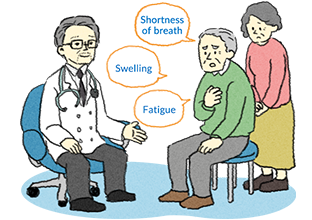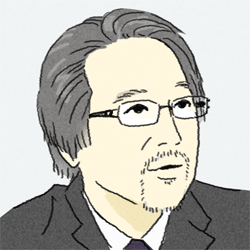Learn about Heart Failure, its Prevention, and Treatment
Director of Cardiovascular Medicine
General Manager of Internal Medicine
Vice-president of Kawaguchi Cardiovascular and Respiratory Hospital

Heart failure is a disease in which the heart is in poor condition, leading to shortness of breath and swelling. The condition worsens, and leads to a shorter life expectancy.
Symptoms seen in the early stages are swelling and shortness of breath. There may also be symptoms of lethargy and fatigue.
"Hidden heart failure", when the condition is concealed by high blood pressure, diabetes, chronic kidney disease (CKD), myocardial infarction, etc., is on the increase. Once heart failure has developed, a patient will be regularly hospitalized, their condition will gradually worsen, and their life will be shortened. Therefore, prevention and treatment to avoid heart failure, or to avoid its recurrence are very important.
Learn more about heart failure
In recent years, the rate of heart failure has increased. Learn more about the clinical condition and treatment.

A message from Professor Naoki Sato
In Japan, heart failure occurences will increase over the next few years up to 2025. The number of elderly heart failure patients has increased dramatically in line with the aging population, but when we take into account the plan to move to a system of regional comprehensive care centers with a decrease in the number of acute care beds, there is the possibility that these patients will not be admitted to hospital even with acute heart failure, and this is expected to lead to a heart failure pandemic. There is a high risk of heart failure leading to death, with approximately 6% of people hospitalized for acute heart failure dying in hospital, and about 22% dying within a year. About 16% are estimated to be re-hospitalized due to heart failure. This is a poor prognosis comparable to that of cancer, which is difficult to treat, but it is not widely recognized. As a response to this prognosis for heart failure, the most important thing is to take appropriate action from the early stages of the disease when symptoms are not yet apparent (hidden heart failure), and to delay its progress. We must look out for the signs of heart failure such as swelling, shortness of breath, and fatigue, prevent future heart failure, and carry out treatment to prevent its recurrence should it develop.
2022 JUN SS2206120
- Protect Yourself From Heat Disorders
- Preventing Traveller's Thrombosis (Economy Class Syndrome)
- Menopause lab (Japanese)
- Living well with menopause
- PMS lab (Japanese)
- men-eki navi (website about "immunity", in Japanese only)
- AMP helps the renewal of skin cells (Japanese)
- Sleep Rhythm Lab (Japanese)
- The surprising facts about dietary fiber
- Everything You Need to Know about GI
- Jump start your brain with a well-balanced breakfast
- Vitamins & Minerals Q&A
- BCAA Helps Maintain Exercise Performance
- Smile Navigator: Schizophrenia (Japanese)
- Smile Navigator: Bipolar disorder (Japanese)
- Smile Navigator: Depression (Japanese)
- Smile Navigator: Pediatric autism spectrum disorder (Japanese)
- Zutsuu-nayami.jp (website about "headaches", in Japanese only)
- Parkinson's Disease
- Restless Legs Syndrome
- Gen-shu.jp ("reducing alcohol consumption", in Japanese only)
- Learn about Heart Failure, its Prevention, and Treatment
- ADPKD.JP (Japanese)
- PAD: Be Careful of Changes in Your Limbs
- Liver cirrhosis nutritional therapy
- Get Your Healthy Stomach Back
- Did You Know There Are Quick Tests for Infectious Diseases?
- Do You Have Symptoms of Dry Eye?
- Decoboco eye: All about eye health (Japanese)
- Atopeace (website about "atopic dermatitis", in Japanese only)
- Acne: Are You Doing Anything About It?





